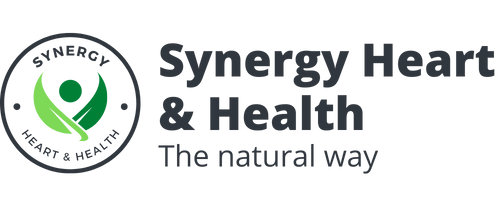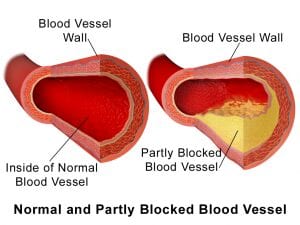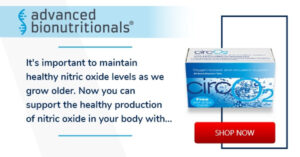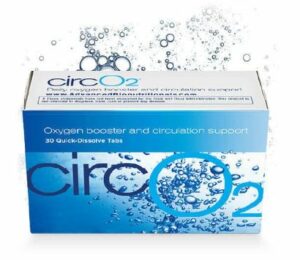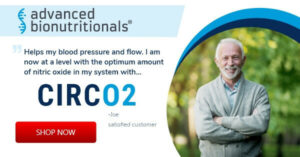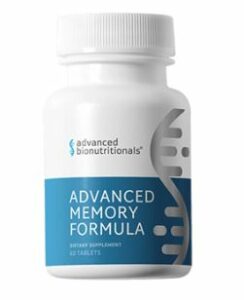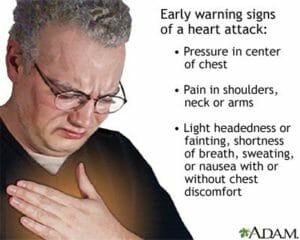 The Best Natural Heart Health Supplements for Optimal Cardiovascular Health
The Best Natural Heart Health Supplements for Optimal Cardiovascular Health
Are you worried about having a heart attack or have you had a heart attack? Is there a history of heart disease in your family? Do you have high cholesterol or high blood pressure? Have you been taking statin drugs (NSAIDs) and the side effects are a worry to you? Perhaps it is time to look at an alternative in the shape of natural heart health supplements but does vitamins for heart health work? and where are the best heart supplements available to buy?
A lot of Questions
That’s a lot of questions in the first paragraph, however, those are important questions to ask yourself especially if you are feeling overtired, stressed or you have experienced chest pain. Why is it that, the most common signs of an impending heart attack or stroke are exactly as I have described? I should know because I nearly died from a very serious heart attack at age forty-five.
I had exactly those symptoms, I felt tired, almost exhausted really, and I was stressed however I didn’t experience any chest pain until that fateful morning when I went to the beach for my usual Saturday morning jog. The chest pain did start as I was halfway through my jog, it pain spread into my left arm, it felt like an elephant was sitting on my chest!
I was one of the lucky ones that managed to get to a hospital within 30 minutes of the heart attack, I will be forever thankful to the Doctors in the Coronary Care Unit that saved my life and allowed me to see my three young daughters and my wife again.
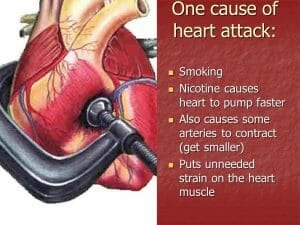
Smoking. Nicotine causes the heart to pump faster. Also causes some arteries to contract (get smaller) and Puts unneeded strain on the heart muscle.
Heart attack statistics
Not everybody that has a heart attack or stroke will live to tell the tale, in fact, according to the Centres for Disease Control studying 2017 someone dies from a heart attack every 40 seconds.
Not only that but every year in the USA as many as 790,000 people will have a heart attack of that number for 580,000 people it is their first heart attack while for 210,000 it will be their second heart attack.
It is staggering! more people are dying from heart disease every year worldwide than all the cancers put together!
Silent heart attacks
Coronary artery disease is the main cause of a heart attack and you may not even know that it is happening, that is why it is called a silent heart attack one in 5 heart attacks is silent, and by the time you realize that you are having one it will be too late, the damage has been done to the heart muscle. A sudden contraction or spasm of the coronary artery is a less common type of heart attack. If you suspect that you or someone you know is experiencing a heart attack you must call emergency services or 911. The longer it takes to get medical attention the more damage to the heart muscle.
What causes Coronary Artery Disease?
Plaque build-up is the main cause of (CAD) Coronary artery disease, plaque consists of fatty deposits of cholesterol along with other substances which build up and stick to the arterial wall. Over time this build-up of plaque will cause the arteries to become narrower leading to a partial blockage or a total blockage of the blood supply and oxygen going to the heart muscle, we call this process atherosclerosis.
Plaque build-up
Excessive amounts of plaque and reduced artery walls could make it more difficult for blood and oxygen to flow to vital organs like the heart.
With restricted blood flow to the heart, you may experience discomfort or chest pain (angina) do not mistake this for indigestion seek help immediately!
The most common symptom of CAD is Angina, which can lead to a weakening of the heart muscle which could trigger heart failure. Heart failure happens when the heart stops pumping blood the way it normally does, other symptoms that could develop are an irregular heartbeat or arrhythmia.

Doctors advise image
Diagnosis
If you haven’t already done so and you are worried about your heart health, you need to make an appointment to see your doctor. Your Doctor will perform several tests to check if you have CAD, these tests will involve a blood test to find out if you have high cholesterol, your blood sugar levels will be checked for diabetes (a CAD risk) you will be asked about your family history about heart disease, you will be asked about your diet and whether or not you take regular exercise.
Smoking is one of the risk factors for CAD as well as high blood pressure, your blood pressure will be checked. If you have the symptoms of Coronary artery disease your doctor will make an appointment for you at the hospital for further tests.
High Blood Pressure
People with high blood pressure run the risk of a heart attack because high blood pressure is a major risk of CAD. High blood pressure happens when the blood pressure in the blood vessels and arteries becomes too high, if this high blood pressure isn’t brought under control it can hurt your heart and other vital organs in the body such as the brain and kidneys.
By lowering your blood pressure with medication or supplements and exercise you reduce your risk of a coronary heart attack or stroke.
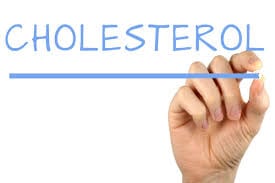
High cholesterol image
High Cholesterol
Cholesterol is produced by the liver, and it is found in some types of food, cholesterol is a sticky fatty material normally the liver will produce enough cholesterol for the body’s needs. Cholesterol is found in certain fatty foods that we eat such as:
1. Butter
2. Lard
3. Goose fat
4. Fatty meat
5. Coconut
6. Palm oils
7. Coconut cream
8. Margarine (lard)
9. Ghee butter
By consuming too much of these types of foods our bodies have too much cholesterol which can build up on the walls of our arteries and around the heart muscle. Over time this build-up of cholesterol will cause blockages in the blood vessels which will affect the flow of blood to vital organs like the heart, brain, kidneys and every other part of our bodies.
Good and bad cholesterol
Cholesterol is defined as either good (HDL) or bad (LDL) cholesterol, if your blood tests show a reading of high cholesterol it means that you have high levels of (LDL) low-density protein which is “bad cholesterol “because it may lead to CAD.
On the other hand, high levels of (HDL) high-density lipoprotein are considered “good cholesterol “because it delivers some insurance against heart disease.
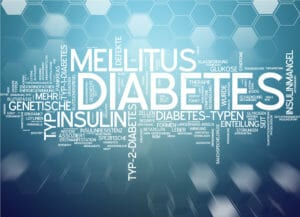
Diabetes
Diabetes
Diabetes or Diabetes mellitus is another risk of heart disease, our bodies naturally need sugar to give us energy. The pancreas produces insulin which is a hormone, it assists in moving glucose from our food into the cells in our bodies, the problem with diabetes is that your body isn’t producing enough insulin, or the insulin isn’t being used as well as it should or both.
Diabetes is responsible for a build-up of sugar in our blood, this increases the risk of dying from a heart attack in those who have diabetes, the risk is especially higher in those with diabetes in comparison to those who don’t.
Common Symptoms of Coronary Heart Disease
Chest pain or angina is the most common symptom of CHD, there are other symptoms that you could experience like heart palpitations or significant breathlessness, or like me, you may not have any symptoms at all.
Angina
Angina occurs when your coronary arteries become partly blocked leading to chest pain. It could be mistaken for indigestion because the symptoms are similar such as an uncomfortable feeling, a severe angina attack usually happens in the middle of the chest, that area will feel heavy or tight, and the pain could spread to your arms, neck, and jaw or stomach area.
Angina can be brought on when doing physical activity (walking up stairs or physical work) sometimes stress can trigger angina, and the symptoms normally last for less than 10-15 minutes they can be quite frightening, relief is found by resting or by using a prescribed nitrate spray
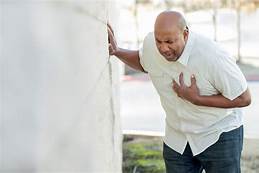
Man holding his chest
Heart attack
A heart attack occurs when your arteries are completely blocked, and the flow of blood to the heart muscles is cut off causing myocardial infarction (heart attack) If not treated quickly it can do long-lasting or permanent damage to the heart muscle or it could be fatal. Call emergency services immediately.
The symptoms may be contrasting, the feeling of discomfort or pain could be like angina but much more severe, and it could happen even when you are at rest.
These are the common symptoms experienced during a heart attack:
- Breathlessness
- Excessive sweating
- Nauseous feeling
- Pain that travels to your arm, jaw, neck or stomach
- Lightheaded
Do not mistake the feelings of heaviness in your chest or stomach for heartburn or indigestion, it can happen at any time, even when you are resting, if the pain lasts any longer than 15 minutes it could be the signal that you are having a heart attack. In contrast to angina, the pain won’t go away using a nitrate spray. People have been known to have a heart attack without any symptoms, this is what’s known as a silent myocardial infarction, it would be more commonplace in older people or people with diabetes.
Heart failure
When the heart becomes overly weak and can’t do its job of pumping blood around the body heart failure can happen to people with Coronary Heart Disease, a side effect is a fluid build-up in the lungs causing breathlessness. Heart failure can happen over a period this is known as acute heart failure or it can occur gradually known as chronic heart failure
What to do if you or someone else is having a heart attack
- Call Emergency or 911 immediately. Do not ignore any chest pain or attempt to brave it out, call a neighbour, family member or friend and ask them to drive you to the nearest hospital. Do not drive yourself unless you have no other choice.
- Take an aspirin, chew and swallow it unless your doctor has advised otherwise. a
- If you have a prescribed nitro-glycerine spray and you feel that you are having a heart attack, take it as per the instructions. Take nitro-glycerine,
- If a person is out cold begin CPR, if you don’t have any CPR training medical experts recommend performing about 100-200 compressions on the chest area until emergency services arrive.
- If you have access to an automated defibrillator and the person is unconscious, follow the instructions for the device.
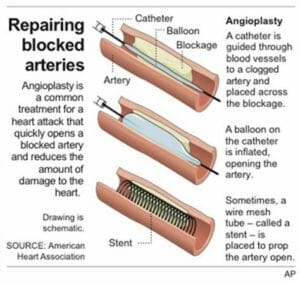
Repairing blocked arteries
Heart attack treatments
When the diagnosis of a heart attack is suspected to confirm the medical staff will quickly start to restore blood flow to the heart muscle, there are two types of treatment clot-busting medication and the other is coronary angioplasty which opens reading blocked arteries. Depending on the severity of the blockage a heart bypass may be used as another form of heart attack treatment.
Heart Medication
Following your heart attack and depending on the outcome your doctor will prescribe some of the following:
- Ace inhibitors: To lower blood pressure and cut down the strain on your heart
- Anti-clotting medications; To prevent platelets from joining together and forming dangerous blood clots
- Anti-coagulants: To keep the blood thin and prevent further blood clots
- Beta blockers: To take the pressure off the workload of the heart and relieve chest pain
- Statin medication: To reduce or control your blood cholesterol
Your doctor will also advise a lifestyle change that will include a low-fat diet and exercise.
Natural Heart Health Supplements
Natural heart health supplements are a viable alternative for those people that seek to use something natural as opposed to using prescribed medication.
However, if you are thinking of using heart health supplements make sure that you are fully informed about how they work, the health benefits, the side effects, and whether it is safe to take them with medication.
Some people have read about the side effects of taking statin drugs over a long period or they have read a book like “No More Heart Disease” written by Doctor Louis Ignarro a well-known scientist.
Doctor Ignarro together with two other scientists received the Nobel prize in medicine for their discovery that Nitric Oxide (a short-lived gas) plays a major role in our bodies in regulating blood flow.
Nitric Oxide Production
Our bodies normally produce Nitric Oxide from the foods that we consume, the Nitric Oxide gas keeps the lining of the arteries called the endothelium soft allowing blood to flow freely to the major organs including the heart. One of the other major benefits of normal Nitric Oxide production is it keeps plaque from building up on the walls of the arteries. So, what happens to cause plaque build-up in the arteries?
The Ageing processes
As we age our bodies change and we find many common health conditions happen to us, heart disease is the most common disease and as described earlier in this article it is the BIGGEST killer of people worldwide. Heart disease can start early in life sometimes in our twenties the plaque build-up can start in our arteries, and people in their middle thirties have had a heart attack.
How to prevent or reverse a heart attack
1. Get your blood pressure under control
Use prescribed medication (blood pressure tablets) or a natural health supplement, we recommend
2. Lower your cholesterol
According to the world health organization, a recommended cholesterol level for people that don’t have heart disease is:
Total cholesterol- less than 200mg/dl, a high-density lipoprotein (HDL) cholesterol level of 60 mg/dl or more is thought to be a protective level against heart disease. A level of less than 50 mg/dl for men and 40mg/dl for women is recognized as a dangerous risk factor for heart disease
To find out how to lower your cholesterol naturally CLICK HERE
3. Remove plaque build-up in the arteries
Without a shadow of a doubt plaque build-up in the arteries combined with bad cholesterol is the main reason for Cardiovascular Heart Disease. The build-up of plaque causes a hardening of the arteries reducing blood flow to the major organs, especially the heart. If you read through Dr Louis Ignarro’s book “No More Heart Disease” it is evident that L-Arginine plays a major role in helping our bodies to produce more Nitric Oxide gas.
Nitric Oxide is the key to removing plaque build-up in the arteries (I am a testament to that) you can read my testimonial CLICK HERE.
To remove plaque build-up in the arteries we recommend an L-Arginine supplement Click Here to order you’re? natural heart health supplements.
NB: As always if you are taking statin drugs or any other type of drug you need to discuss taking any supplement with your doctor before proceeding.
Watch Video
YouTube
Acknowledgements
https://www.cdc.gov/diabetes/pdfs/data/statistics/national-diabetes-statistics-report.pdf
https://www.cdc.gov/heartdisease/heart_attack.htm
Related Articles
Blocked heart artery and heart disease faqs
Best vitamins for heart health
Why is arterial plaque so dangerous?
The ultimate guide to liver detox with advanced liver support
Search
Categories
- Adrenal fatigue
- Aging
- Beauty Products
- Beauty Products
- Bladder Health
- Blocked fallopian tubes
- Blood Flow
- Bones
- Calcification of the arteries
- Carpal Tunnel Syndrome
- Cholesterol
- Circulation
- CLE Holistic
- Copd Emphysema
- Diabetes
- Endometriosis natural treatment
- Erectile dysfunction
- Eye health
- FAQ
- Female health
- Gout
- Gut Health
- Hair loss
- Heart disease
- Heartburn
- High Blood Pressure
- Hip Bursitis
- Hip leg pain
- Ice Barrel
- Immune system
- Indigestion
- Inflammatory Diseases
- Liver Function
- Medical questions answered by a Doctor
- Memory
- Mental health
- Migraines
- Mitochondrial
- Muscle loss in old age
- Nerve Vitamins
- Numbness tingling
- Peyronies disease
- Posts
- Premature ejaculation
- Probiotics
- Prostate
- Scar Tissue
- Sexual Health
- Sinus Infection
- Sleep disorders
- Stress
- Supplements reviews
- TESTIMONIALS
- Testosterone
- Trace minerals
- Vitamins
- Weight loss supplements
Newsletter
Sign up and stay informed
Synergy Hearth & Health
Thank you!
You have successfully joined our subscriber list.
